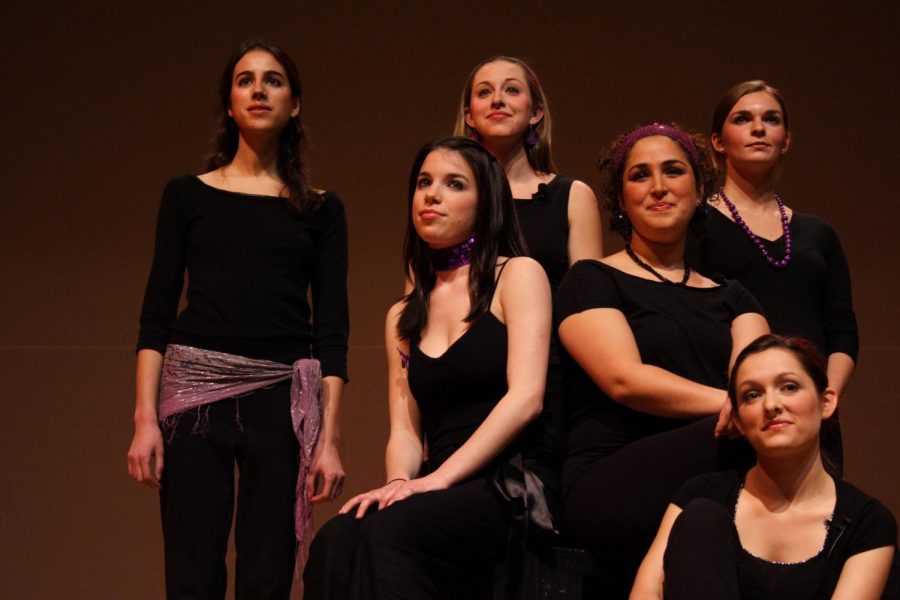“The Vagina Monologues” starts conversation to normalize women, sex
February 14, 2019
The Center for Women’s Studies will put on the episodic play, “The Vagina Monologues” for the university Feb. 21. It will take place in the GUC Performance Center from 7-9 p.m.
The production of “The Vagina Monologues” donations will fund the Center for Women’s Studies and the playwright’s charity, V-Day.
The “V” in V-Day stands for victory, valentines, and vagina, according to vday.org. It is a global movement to end violence against women.
“The Vagina Monologues” is a play by Eve Ensler crafted based on a series of interviews of women from various walks of life, mostly from the United States, but with some entries from international women,” said sophomore and co-director of the event Bonnie Smith. “The show is hilarious, inspiring, heart wrenching and, most of all, a great conversation starter. Really, it’s all about creating a dialogue that allows women to have agency over their bodies while shedding light on the violence that many women face.”
Smith said the Center for Women’s Studies have semi-annually performed the play for about a decade and it becomes relevant every year.
Over the years, “The Vagina Monologues” has become a familiar show to students on campus. However, not all students are thrilled to hear about it.
“I think the title The Vagina Monologues can be kind of off putting and weird for some people,” said junior Montana Statum. “I understand wanting to draw attention, but that can draw in the wrong attention.”
Statum said it makes her think of aggressive feminism. She believes there are more effective ways to draw people in.
“The Vagina Monologues” was not Eve Ensler’s original focus for the play. It began when she held a conversation with a friend about her vagina, according to theguardian.com.
“As the issues that women face, especially on campus, become deeper and more muddled, keeping the conversation personal and real humanizes women instead of reducing our student body to statistics,” Smith said.
Smith said when female students talk about safety on campus, they are not showered with praise, despite the recent accusation of sexual harassment leading to the removal of a UNA professor, the Jane Doe case and alcohol still being weaponized on campuses around the country.
As far as the Shoals community goes, Smith said she feels like the university could write monologues of their own.
“While the Shoals is relatively progressive, it’s difficult for myself and my fellow women to even go a day without some transgression– catcalling and body policing committed against us,” Smith said. “Small as it may be, the effect remains. Feminist has become the new F word and it’s a human rights movement seeking equality.”
Although the play is almost 25 years old, Smith believes the messages still remains pertinent.
“When talking about the show, I often times ask women how much they hear male comedians or entertainers, even political figures, talk about their penises,” Smith said. “Then, I follow it up with ‘What if vaginas were even that much a part of the conversation?’ Even that question, which has very little to do with the more serious issues in the show like body dysmorphia and violence leaves their mouths agape. It is our job to even that playing field.”
Smith said this is why she encourages many of her male colleagues to see the show.
“Not only will they enjoy it, but they’ll learn,” Smith said. “The play has nothing against men and is only an entertaining tool to show real experiences from real women. Ultimately, by talking about vaginas and what women go through because of them, we are getting that dialogue started and beginning a process of education and empowerment.”
Coordinator of the Center for Women’s Studies Emily Kelley said “The Vagina Monologues” broadens everyone’s horizons.
“I think that it’s absolutely hilarious and it puts a wonderful spin on things,” Kelley said. “But there are some serious parts of it. It’s very important for men, not only to get in touch with their feminine side, but also so that they better understand their sisters, mothers, girlfriends, grandmothers, and everybody.”












